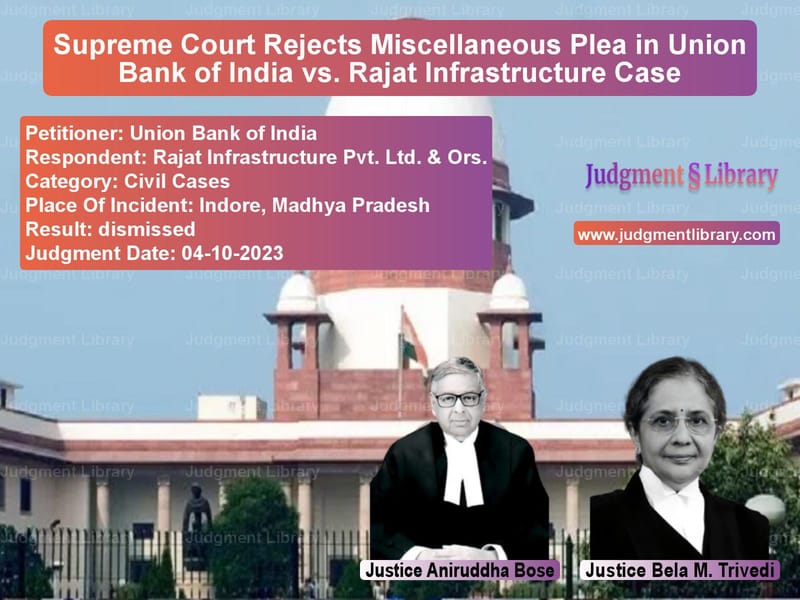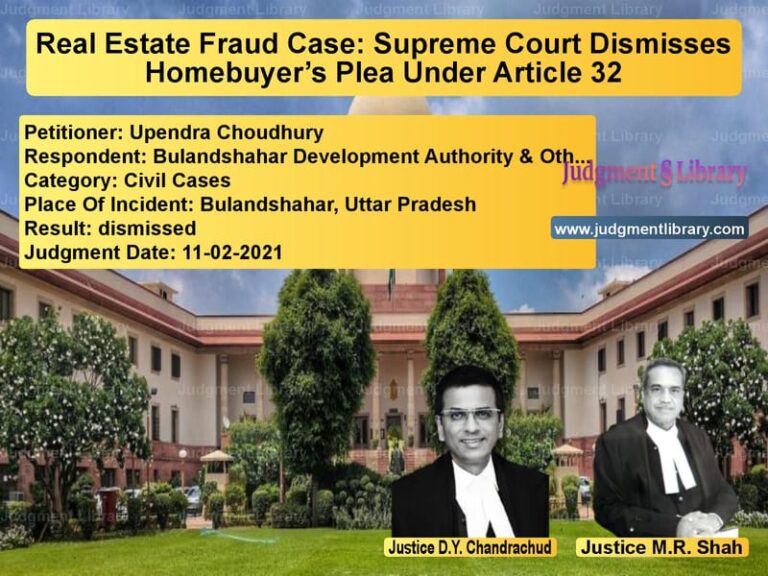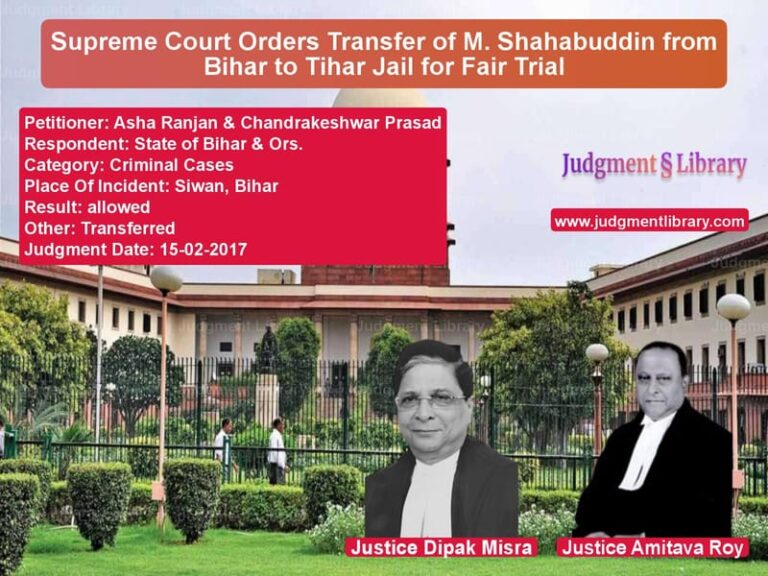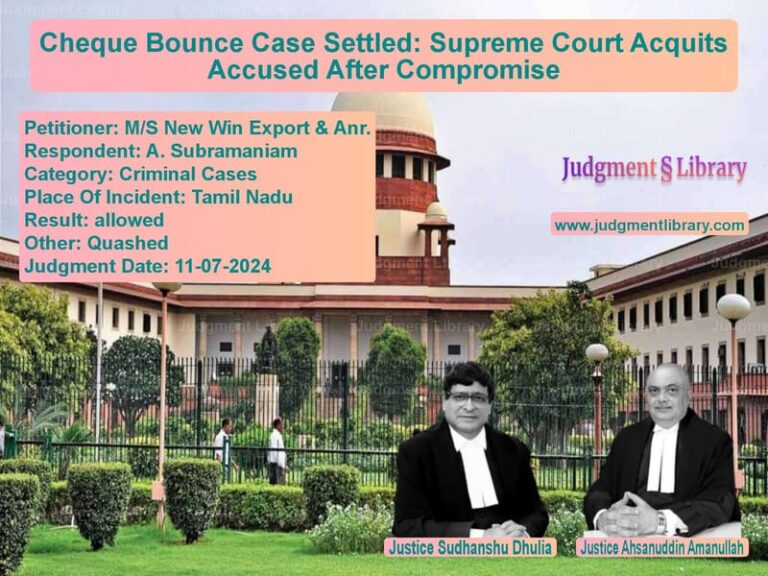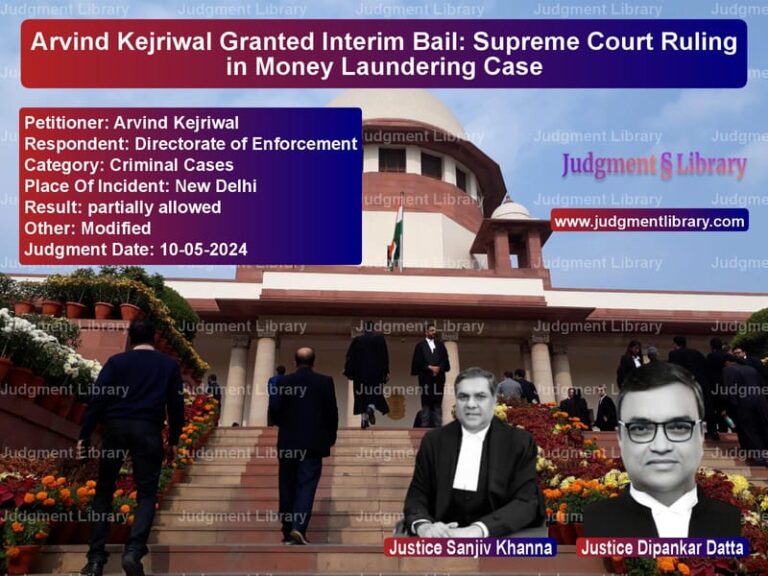Supreme Court Rejects Miscellaneous Plea in Union Bank of India vs. Rajat Infrastructure Case
The Supreme Court of India recently dismissed a Miscellaneous Application (M.A. No. 1735 of 2022) in the long-running case of Union Bank of India vs. Rajat Infrastructure Pvt. Ltd. & Ors.. The ruling centered on whether an auction purchaser, M/s Sunview Assets Pvt. Ltd., was entitled to a sale certificate for a property it acquired through an auction under the Securitisation and Reconstruction of Financial Assets and Enforcement of Security Interest (SARFAESI) Act, 2002. The Court ruled against the applicant, stating that it had failed to comply with the time-bound conditions set in earlier judgments.
Background of the Case
The dispute revolved around a 109,754 square feet property in Indore, mortgaged to the Union Bank of India by Rajat Infrastructure Pvt. Ltd. as security for a loan granted to Zoom Developers Pvt. Ltd. and Zoom Vallabh Steel Ltd. When the borrowers defaulted, the bank initiated proceedings under SARFAESI to recover its dues.
The property was auctioned in 2019, with M/s Sunview Assets Pvt. Ltd. emerging as the highest bidder, offering Rs. 65.62 crore. However, due to delays in payment, the auction purchaser repeatedly sought extensions from the Supreme Court. The Court granted several extensions, citing the COVID-19 pandemic, but ultimately ruled that further delays could not be permitted.
Arguments by the Petitioner – Sunview Assets Pvt. Ltd.
The auction purchaser made the following arguments in its plea:
- Full Payment Was Made: The applicant claimed that it had fully paid the auction amount along with interest as per the Supreme Court’s previous orders.
- COVID-19 Delays: The pandemic and resultant lockdowns caused severe financial distress, making it difficult to raise the required funds within the originally stipulated time.
- Flexibility in SARFAESI Implementation: The applicant contended that the bank should have exercised its discretion to grant further extensions given the exceptional circumstances.
- Entitlement to Sale Certificate: Since the full payment had eventually been made, the applicant argued that it was entitled to receive the sale certificate and ownership rights over the property.
Arguments by the Respondents – Union Bank of India & Rajat Infrastructure
The respondents, including the bank and Rajat Infrastructure, opposed the application, making the following points:
- Repeated Non-Compliance: The auction purchaser failed to meet the multiple deadlines set by the Supreme Court, even after multiple extensions.
- Violation of SARFAESI Rules: As per Rule 9(4) of the SARFAESI Rules, the full payment should have been made within 15 days of confirmation of sale, or within a maximum extension period of 3 months, as agreed between the bank and the purchaser.
- Forfeiture of Rights: The bank had the right to cancel the sale and re-auction the property if the purchaser failed to comply with the payment schedule.
- Litigation Tactics: The respondents accused the applicant of using legal proceedings to delay the process indefinitely and avoid accountability.
Key Observations by the Supreme Court
The Supreme Court provided several critical observations while dismissing the plea:
1. Strict Adherence to SARFAESI Rules is Mandatory
The Court held that Rule 9(4) of the SARFAESI Rules mandates that the balance payment must be made within 15 days of sale confirmation. Any extension beyond 3 months would violate the statutory framework, making it unenforceable.
2. No Further Extensions Beyond Court-Granted Relief
While the Court had previously extended the deadline due to COVID-19, it clarified that the time extensions could not be indefinite. The Court stated:
“When a statute requires a particular thing to be done in a particular manner, it must be done in that manner or not at all.”
3. Miscellaneous Applications Cannot be Used to Circumvent Final Judgments
The Court observed that litigants increasingly file Miscellaneous Applications (M.A.) after a final judgment has been delivered to seek additional relief. The judgment strongly disapproved of this practice:
“A disturbing trend has emerged in this Court of repeated applications, styled as Miscellaneous Applications, being filed after a final judgment has been pronounced. Such a practice has no legal foundation and must be firmly discouraged.”
4. Auction Purchaser’s Rights Had Lapsed
Since the applicant failed to meet the extended deadline of April 30, 2022, its claim over the property was no longer valid. The Court clarified that Rule 9(5) of SARFAESI Rules allows forfeiture of deposit and resale of the property if payment conditions are not met.
5. Open to Other Legal Remedies
While the Court dismissed the Miscellaneous Application, it stated that the applicant could pursue other legal remedies if applicable, including filing a suit for a refund of the amount paid.
Supreme Court’s Final Ruling
Based on these findings, the Supreme Court:
- Dismissed Miscellaneous Application No. 1735 of 2022, ruling that it was not maintainable.
- Confirmed that the auction purchaser had lost its right to the property due to non-compliance with SARFAESI timelines.
- Directed the bank to follow legal procedures in disposing of the property.
- Allowed the applicant to seek alternative legal remedies, such as claiming a refund of deposited amounts.
Implications of the Judgment
The Supreme Court’s ruling carries important implications:
- Reinforces SARFAESI Compliance: This judgment ensures that banks and borrowers adhere strictly to SARFAESI’s timelines, preventing prolonged litigation.
- Prevents Abuse of Miscellaneous Applications: The ruling sets a precedent against the misuse of post-judgment applications to delay compliance.
- Strengthens Auction Sale Procedures: The decision protects the integrity of property auctions by ensuring that payments are made as per statutory requirements.
- Clarifies Court’s Stance on Extensions: The judgment makes it clear that statutory deadlines cannot be indefinitely extended, even under extraordinary circumstances.
Conclusion
The Supreme Court’s decision in Union Bank of India vs. Rajat Infrastructure Pvt. Ltd. upholds the sanctity of SARFAESI’s statutory framework and reinforces judicial discipline in financial recovery matters. By dismissing the Miscellaneous Application, the Court reaffirmed that auction purchasers must strictly adhere to statutory timelines and that post-judgment applications cannot be misused to delay compliance. This ruling is a significant step towards streamlining financial asset recovery and ensuring fairness in banking and property auctions.
Petitioner Name: Union Bank of India.Respondent Name: Rajat Infrastructure Pvt. Ltd. & Ors..Judgment By: Justice Aniruddha Bose, Justice Bela M. Trivedi.Place Of Incident: Indore, Madhya Pradesh.Judgment Date: 04-10-2023.
Don’t miss out on the full details! Download the complete judgment in PDF format below and gain valuable insights instantly!
Download Judgment: union-bank-of-india-vs-rajat-infrastructure-supreme-court-of-india-judgment-dated-04-10-2023.pdf
Directly Download Judgment: Directly download this Judgment
See all petitions in Contract Disputes
See all petitions in Debt Recovery
See all petitions in Judgment by Aniruddha Bose
See all petitions in Judgment by Bela M. Trivedi
See all petitions in dismissed
See all petitions in supreme court of India judgments October 2023
See all petitions in 2023 judgments
See all posts in Civil Cases Category
See all allowed petitions in Civil Cases Category
See all Dismissed petitions in Civil Cases Category
See all partially allowed petitions in Civil Cases Category

